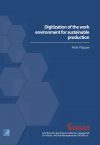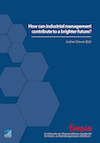Search


Bibtex
Cite as text
@Inbook{Deuse+Hoffmann+Sick+Bennett+Lammers+Hernandez Moreno,
Cite-key = "Deuse2022wgab",
Year= "2022",
Volume= "Schriftenreihe der Wissenschaftlichen Gesellschaft für Arbeits- und Betriebsorganisation (WGAB) e. V.",
Pages= "193-205",
Journal = "WGAB",
Title= "Digitization of the work environment for sustainable production – How could algae based sink technologies enable a neutral Product Carbon Footprint?",
Author= "Jochen Deuse1,2, Florian Hoffmann2, Nathalie Sick1, Nick Bennett1, Thorsten Lammers1, Victor Hernandez Moreno1
1) Centre for Advanced Manufacturing, University of Technology Sydney
2) Institute of Production Systems, TU Dortmund University
",
Doi= "https://doi.org/10.30844/WGAB_2022_10",
Abstract= "The alarming progress of climate change requires immediate and rigorous action from our society. This also affects the manufacturing industry to a large extent. Many companies have recognised the situation and set themselves ambitious goals with regard to achieving CO2 neutrality. An important step is the detailed analysis of CO2 emissions across the entire supply chain, differentiated by Scopes 1, 2 and 3. Initiated by Siemens, industry and university partners worldwide are currently in the process of founding a non-profit, non-government organisation, called Estainium. Remarkable about the goals of the organisation is that not only CO2 sources, but in particular certified CO2 sinks are to be integrated into the emerging platform. Terrestrial and aquatic sinks without the desired CO2 neutrality could not be achieved must be connected in a clearly traceable and fraud-proof manner. The paper describes the need to create transparency with regard to a product-related carbon footprint and the development of a closed sink system for the accurate carbon capture of emissions generated by value-added processes.",
Keywords= "Sustainability, Product carbon footprint, Carbon capture, Technical aquatic sinks, Internet of Things",
}
Jochen Deuse1,2, Florian Hoffmann2, Nathalie Sick1, Nick Bennett1, Thorsten Lammers1, Victor Hernandez Moreno1
1) Centre for Advanced Manufacturing, University of Technology Sydney
2) Institute of Production Systems, TU Dortmund University(2022): Digitization of the work environment for sustainable production – How could algae based sink technologies enable a neutral Product Carbon Footprint?. Schriftenreihe der Wissenschaftlichen Gesellschaft für Arbeits- und Betriebsorganisation (WGAB) e. V.(2022), S. 193-205. Online: https://doi.org/10.30844/WGAB_2022_10 (Abgerufen 27.07.24)
Open Access
Abstract
Abstract
The alarming progress of climate change requires immediate and rigorous action from our society. This also affects the manufacturing industry to a large extent. Many companies have recognised the situation and set themselves ambitious goals with regard to achieving CO2 neutrality. An important step is the detailed analysis of CO2 emissions across the entire supply chain, differentiated by Scopes 1, 2 and 3. Initiated by Siemens, industry and university partners worldwide are currently in the process of founding a non-profit, non-government organisation, called Estainium. Remarkable about the goals of the organisation is that not only CO2 sources, but in particular certified CO2 sinks are to be integrated into the emerging platform. Terrestrial and aquatic sinks without the desired CO2 neutrality could not be achieved must be connected in a clearly traceable and fraud-proof manner. The paper describes the need to create transparency with regard to a product-related carbon footprint and the development of a closed sink system for the accurate carbon capture of emissions generated by value-added processes.
Keywords
Schlüsselwörter
Sustainability, Product carbon footprint, Carbon capture, Technical aquatic sinks, Internet of Things

 English
English
